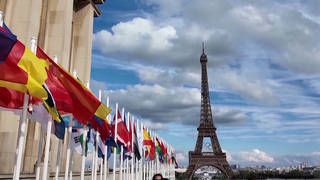
The 2010 Winter Olympic Games are opening today in Vancouver. Large-scale protests are planned over the weekend. The Olympic Resistance Network has organized a people’s summit to coincide with the Games’ opening ceremonies. Franklin Lopez of the Vancouver Media Co-op filed this report. [includes rush transcript]
Transcript
JUAN GONZALEZ: Well, the 2010 Winter Olympic Games are opening in Vancouver today. Large-scale protests are planned over the weekend. The Olympics Resistance Network has organized a people’s summit to coincide with the Games’ opening ceremonies.
Franklin Lopez of the Vancouver Media Co-op filed this report.
FRANKLIN LOPEZ: Vancouver, BC is abuzz with the Olympic fever. But there is something a little bit different this time around. What started out as hundreds of local people organizing against the Olympic bid has turned into an international convergence of thousands coming from around the world preparing to confront the 2010 Games.
HARJAP GREWAL: It’s a unique moment in history, because a call for a convergence normally happens at the G8, WTO and World Bank summits that happen around the world, and this time organizers have actually called for a demonstration against the Olympics industry. We don’t see the Olympics industry as being that much different than these other institutions that are unaccountable to the people of the world. The IOC is like the WTO. The IOC is like the IMF, is like the World Bank. And it encourages the transfer of wealth from public hands to private pockets.
FRANKLIN LOPEZ: That was Harjap Grewal of the Olympic Resistance Network.
PROTESTERS: No homes, no peace, no racist police!
REPORTER: Even though the Anti-Poverty Committee has demonstrated its pension for violence in the past.
FRANKLIN LOPEZ: Though demonized in the media, the Olympic Resistance Network is getting their message out, as the anti-Olympic movement grows. A recent poll shows that a landslide of British Columbians think too much is being spent on the two-week sporting event. Here’s Harsha Walia of the Olympic Resistance Network.
HARSHA WALIA: We see that the Games have been overrun with a budget of over $7 billion; indigenous lands continue to be exploited and stolen, with ski resort development all across British Columbia; increasing poverty and criminalization of the poor in the Downtown Eastside; a massive cutback in public spending; and an increasing budget for policing and militarization here in Vancouver. We have $1 billion that are being sunk into a military-police state in the lead-up to the Olympics.
FRANKLIN LOPEZ: But protesters are looking beyond the escalating budget. Their primary slogan is “No Olympics on stolen Native land,” which calls attention to the unresolved land struggles unique to the region. Gord Hill at No2010.com explains.
GORD HILL: Well, here in BC, in particular, it refers to the history of colonialism here in the province and the lack of treaties that the government was required by its own laws to make in its western expansion across Canada. So when they got to BC, which was just forming itself as a colony at that time under the British, they started to make treaties. The first ones, they’re known as the Douglas Treaties, after the first governor. And he made a number of small treaties on Vancouver Island. And then, after that, they just stopped the process and just imposed government control over all these indigenous lands here in the province. It’s illegal, and it’s actually immoral, because they were bound by their own laws to make treaties before they settled on any land or any business took place on sovereign indigenous land.
FRANKLIN LOPEZ: Indigenous peoples make up a disproportionate amount of the population of Vancouver’s Downtown Eastside, the neighborhood critics argue has been most affected by the Games. Vancouver and Whistler are under siege by increasing police and military forces in town to secure the Olympic Games. Poor people, anti-Olympic activists and supporters have been harassed and threatened by the police, border guards and intelligence agents over the last year. Here’s sportswriter Dave Zirin.
DAVE ZIRIN: My beef with the Olympics is that, everywhere they go, you see the same three things. You see police repression. You see budget-busting graft. And you see hardcore gentrification and displacement. And that’s true no matter where the Olympics go. Like most people know about how this went down in Beijing. But it’s not a China issue, it’s not a Beijing issue. It’s an Olympics issue. It’s wherever they go, they make these demands of a given community. And I don’t think any community should have to deal with that to host a sporting event.
FRANKLIN LOPEZ: The Olympics are big business for the International Olympic Committee and its corporate partners, which include Coca-Cola, McDonald’s, Royal Bank of Canada and Chevrolet. This is an unprecedented mobilization in Vancouver, and organizers here expect resistance to the Olympic industry to carry far beyond February 2010.
AMY GOODMAN: That report by Franklin Lopez, with Isaac Oomen and Dawn Paley of the Vancouver Media Co-op.












Media Options